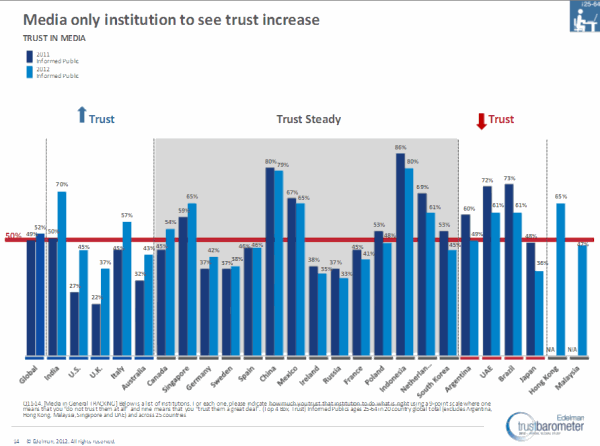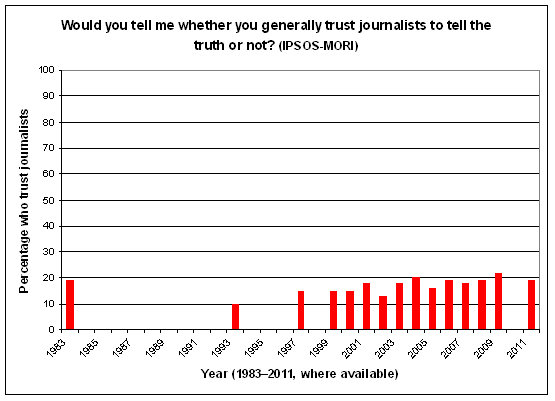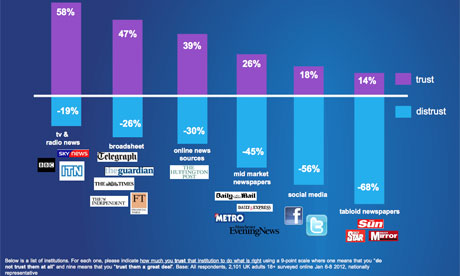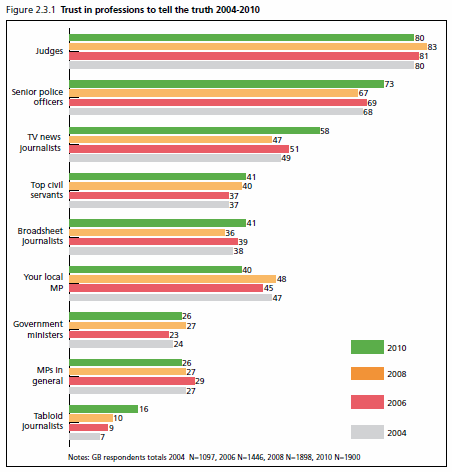Has trust in UK journalism increased significantly?
A survey released today reports that trust in the media in the UK has risen from 22 per cent to 37 per cent over the past year.
It is the first survey series we are aware of to have asked the same questions about trust in the press before and after allegations about the hacking murdered teenager Milly Dowler's phone came to light.
So it is surprising result to arrive at a time when illegality, poor ethics and, as Full Fact has been pointing out, widespread carelessness with the facts from the press are under such scrutiny.
There are some things that help to explain the result that Edelman (who conducted the study) have arrived at, but it is not on its own enough to make us optimistic about the public's view of journalists generally.
Join 72,953 people who trust us to check the facts
Sign up to get weekly updates on politics, immigration, health and more.
Subscribe to weekly email newsletters from Full Fact for updates on politics, immigration, health and more. Our fact checks are free to read but not to produce, so you will also get occasional emails about fundraising and other ways you can help. You can unsubscribe at any time. For more information about how we use your data see our Privacy Policy.

The Edelman Barometer is a respected source but it is also an unusual survey on this topic.
First, it is not a survey of the general public but, as they explain, of those people who "met the following criteria: college-educated; household income in the top quartile for their age in their country; read or watch business ? news media at least several times a week; follow public policy issues in the news at least several times a week."
As Polly Curtis of the Guardian's Reality Check has calculated, the sample size means that country-specific results are based on answers from an average of just 224 respondents. Moreover, the sudden rise is only a return to 2008 levels.
Second, the question asked was: "Below is a list of institutions. For each one, please indicate how much you trust that institution to do what is right" whereas other surveys mentioned below ask respondents whether they trust the media "to tell the truth." Another common question is simply "how trustworthy or untruthworthy is…?"
The longest time series shows trust remaining stable at low levels. This is from a series of IPSOS-MORI surveys of around 2,000 British adults asking "to tell the truth" but also headlined as 'trust'.

IPSOS-MORI calculate the "sector average 'trust'" in journalists from 1983 to 2011 as just 17 per cent.
Interestingly, Edelman repeated their survey with a larger sample and apparently got the same result as they did with the smaller sample. We are waiting to get the source data to check this.
[UPDATE 25 Jan: In their survey of c.1,000 UK adults, Edelman asked people to "indicate how much you trust that institution to do what is right using a 9-point scale where one means that you 'do not trust them at all' and nine means that you 'trust them a great deal'." 32 per cent rated the media at 6, 7, 8 or 9, slightly lower than the 37 per cent of the "informed public" that made headlines yesterday.]
In that survey they also broke down trust in the media by type of outlet.

These findings echo the findings of another regular source of trust data, the Commission for Standards in Public Life's Surveys of Public Attitudes. That bodes well for the Edelman Barometer's headline results.
However, it emphasises one impact of Edelman's sample of the "informed public," in that people in the sample are disproportionately likely to be reading the more trusted sections of the media such as broadsheet papers—one of which, the Guardian, took the lead in exposing the phone hacking scandal.

As you can see from these figures, the Commission for Standards in Public Life found trust in all kinds of journalists was higher in 2010 than in previous years.
They argue: "These are perhaps unsurprising results in the aftermath of the expenses scandal. Journalists seem to have been praised for breaking the news and policemen for enforcing the law whereas local MPs paid a price."
So Edelman's results are not quite as surprising as they seem:
- They represent a reversion to previous levels rather than a big jump, in keeping with the stable low trend of trust in journalism found by IPSOS-MORI.
- There is some precedent for thinking trust might have risen recently.
- The fact that the headline figure for trust is higher than elsewhere may well reflect the quirks of the sample.
But what about the effects of phone hacking? It will be interesting to see this year's Veracity Index from IPSOS-MORI to see what they make of it but some research has already been done.
10 weeks ago, a YouGov survey for PBS asked: "You may recall a news story originating from the UK in July earlier this year which was about phonehacking allegations and the media. How, if at all, have the recent phone-hacking revelations affected your trust in both the UK media as a whole, and specifically in the UK's newspapers?" (page 10).
51 per cent said it had reduced their trust in the media as a whole, and 58 per cent said it had reduced their trust in newspapers specifically.
It would be striking if that result had been followed by people reporting higher levels of trust in the media, so it is far too early to declare a trend of either way.
For now, we expect that public trust in journalists will stay stable and low while there is still a substantial body of journalism that is careless with its facts.
-----------------
Full Fact is the only independent organisation that checks the accuracy of the claims made by the media and politicians. Our work is supported by reader donations, so if you value the work we do and want to help make politics more trustworthy please consider donating.